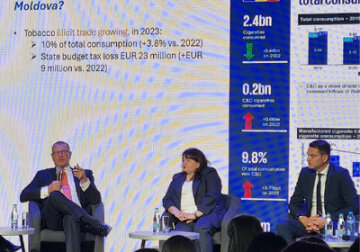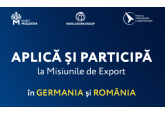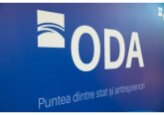
Illicit tobacco trade share in Moldova amounted to about 10% of total consumption in 2023, increasing by 3.8% compared to the previous year
As Viktor Zemlicka, International Trade and Investment Consultant, noted at the TAXCON'24 conference held in Chisinau, according to the KPMG research, the state budget lost about €23 million in taxes as a result, which is by €9 million more than in 2022. “The growth of illegal trade not only damages the economy, but also creates health risks for consumers and reduces confidence in the market. Smuggling, counterfeiting and incorrect declaration of goods lead not only to losses in tax revenues, but also to the destruction of brand reputations and destabilization of legal distribution channels,” he said. One of the most successful examples of the fight against illegal trade, in his opinion, is the tobacco tracking system (Track and Trace) implemented in the European Union. Since its launch in 2019, the system has effectively monitored the cigarette market in 27 EU countries as well as the UK. From May 2024, the system is gradually being extended to new tobacco products. It prevents losses of up to €4 billion annually and covers more than 1.5 million economic operators, monitoring more than 50 billion units per year. “The success of this system is due to the introduction of unique identifiers for each unit of product and the use of digital solutions to monitor all stages of product movement, from production to the final point of sale. All the information is uploaded to a central database, which allows real-time monitoring and verification of the authenticity of goods and operations with them,” the expert emphasized. According to him, Moldova, as a country striving for EU integration, can learn from the European experience and start developing and implementing a system of goods tracking already now. It is recommended to introduce digital solutions for supply chains, compatible with the EU system, taking into account the specifics of the local market. An important aspect is to adjust the system to local conditions to ensure its efficiency and minimize costs for business and government. According to the expert, the best option for Moldova would be a gradual implementation of the system, starting with fiscal labeling and tracking of tobacco products, followed by adaptation to the more complex EU structure. Great Britain, which has already successfully implemented a similar system, can become an example for Moldova,” Viktor Zemlicka said. He emphasized that the successful implementation of the system requires close cooperation between the government, business and technology providers. The monitoring systems should take into account Moldova's strategic and geopolitical priorities, as well as be flexible for further adaptation to the EU requirements. As previously reported, in 2023, the Moldovan Parliament approved a project aimed at aligning national legislation with the World Health Organization Protocol to Eliminate Illicit Trade in Tobacco Products. This project should ensure the implementation of the Track and Trace system. According to the project, it is required to develop technical regulations by March 2024, from 2025 to launch the Track and Trace system in pilot mode and in 2026 to fully implement the mechanism, but experts point to possible delays in the launch of this system. Data shows that illicit trade causes global losses of up to €3 trillion annually and Moldova cannot afford to ignore the problem. Historically, the Track and Trace system has proven to be an effective tool for combating illicit trade at the EU level. The system was introduced as part of the European Union Directive 2014/40/EU, which came into effect in 2019. It provides real-time tracking of the movement of tobacco products through unique identifiers. The system operates in 27 EU countries and the UK and has been extended to all tobacco products. //24.09.2024 — InfoMarket.







